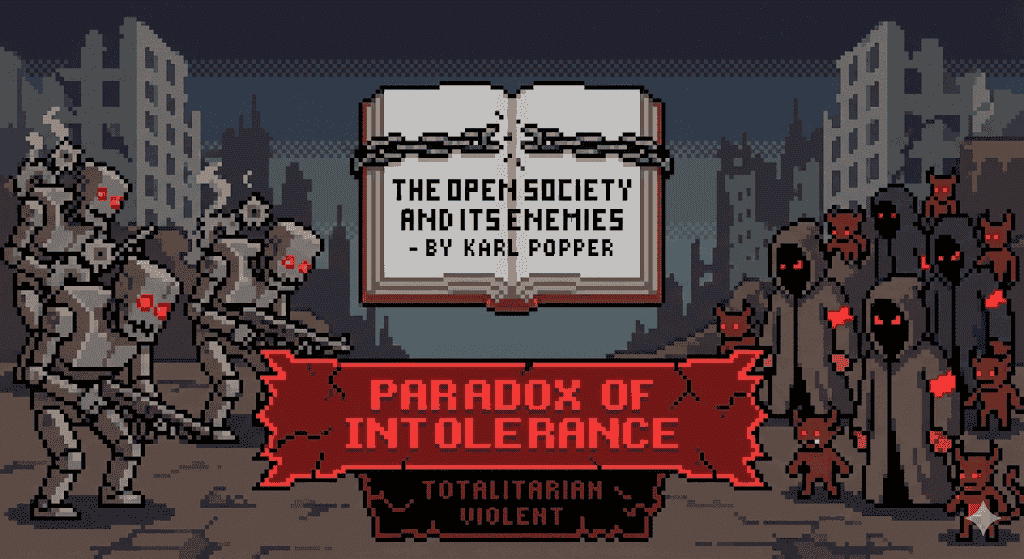System Analysis
The Paradox of Intolerance as Crisis of Our Era
// SYSTEM DIRECTORY
OPERATIONAL CONTEXT: The contemporary crisis of political violence is not a random glitch; it is the logical output of a flawed philosophical doctrine ("The Open Society") running on the corrupted hardware of the modern activist.
// SECTOR 01: THE SOURCE CODE (POPPER'S PARADOX)
Written in exile during WWII, The Open Society and Its Enemies was a defense of democracy against totalitarianism. However, it contained a "sleeper code"—a paradox that would later be weaponized by the very forces it sought to oppose.
"Unlimited tolerance must lead to the disappearance of tolerance. If we extend unlimited tolerance even to those who are intolerant... then the tolerant will be destroyed, and tolerance with them... We should therefore claim, in the name of tolerance, the right not to tolerate the intolerant."
— Karl Popper
— Karl Popper
CRITICAL DISTINCTION:
Popper explicitly stated: "I do not imply... that we should always suppress the utterance of intolerant philosophies; as long as we can counter them by rational argument... suppression would certainly be most unwise."
Status: This safety protocol has been deleted by modern activists.
Status: This safety protocol has been deleted by modern activists.
// SECTOR 02: SYSTEM FLAW (THE AUTHORITARIAN TITLE)
The strongest indicator of the doctrine's flaw is its title: The Open Society and Its Enemies. Structurally, this is: "Thesis, and the Enemies of my Thesis." It is inherently militant.
"The" vs "An": The choice of the singular definite article implies a monolithic, singular goal. It is not "An Open Society" (one of many possibilities), but "THE Open Society."
"The" vs "An": The choice of the singular definite article implies a monolithic, singular goal. It is not "An Open Society" (one of many possibilities), but "THE Open Society."
DOCTRINAL PARADOX:
We do not have an authoritarian leader; we have an authoritarian doctrine. The doctrine itself demands the identification and destruction of "Enemies."
One-Liner Insight: A doctrine that cannot tolerate dissent eventually cannot tolerate reality.
One-Liner Insight: A doctrine that cannot tolerate dissent eventually cannot tolerate reality.
// SECTOR 03: THE CRISIS (SEPTEMBER 12, 2025)
I am writing this commentary two days after the political assassination of Charlie Kirk. My claim is that a large faction of people in contemporary liberal democracies have internalized The Paradox of Intolerance via general civics courses, but stripped of its safeguards.
The faction that cheered this death are contemporaries who have superficially internalized the mission—"Prevent another Hitler"—but are operating in a catastrophically flawed mode.
Related Analysis: Blood Feuds & The Modern Plaintiff
The faction that cheered this death are contemporaries who have superficially internalized the mission—"Prevent another Hitler"—but are operating in a catastrophically flawed mode.
SYSTEM FAILURE:
Charlie Kirk was, in performance, doing exactly what Popper advised: countering arguments with rational argument. The faction that killed him was doing exactly what Popper warned against: "forbidding their followers to listen to rational argument."
Irony: The "Defenders of Democracy" have become the "Pistol-Bearing Intolerants."
Irony: The "Defenders of Democracy" have become the "Pistol-Bearing Intolerants."
// SECTOR 04: BROKEN ROBOTS (MALFORMED CODE)
This faction acts like broken robots running on malformed code. They are on a drug-like high where the slightest ripple in orthodoxy is labeled "Nazi." Their sequence is predictable:
System Alert: The Psychology of the Radical
- Identify Dissent.
- Label as "Intolerant" (Hitler).
- Execute "Paradox Protocol" (Social Death or Actual Murder).
THE CHOREOGRAPHY OF FORCE:
Social contexts behave like choreography. If the partner dances poorly (violence), it requires you to dance poorly (force) to stop them.
The Hard Truth: Since this faction has escalated to real murder, the counter-move requires force. Arrests, prisons, and state-sanctioned penalties are the "nicest" mode of restoring order. The alternative is civil war.
The Hard Truth: Since this faction has escalated to real murder, the counter-move requires force. Arrests, prisons, and state-sanctioned penalties are the "nicest" mode of restoring order. The alternative is civil war.
// SECTOR 05: THE CHRISTIAN ALGORITHM
While we must physically stop the murderers, we must not become them spiritually. This is where the Christian framework provides the ultimate edge.
Christians who pray in sincere self-reflection and seek to confront the world informed by Jesus have a distinct advantage: their system is designed to rise above the "meanness and stupidity of man."
System Defense: Social Clash Protocol
Christians who pray in sincere self-reflection and seek to confront the world informed by Jesus have a distinct advantage: their system is designed to rise above the "meanness and stupidity of man."
FINAL DIRECTIVE:
Even if we must use the state's sword to stop the chaos, our internal software must remain uncorrupted.
Personal Statement: I see this murderous faction as propelled by something spiritually evil. It is a death cult dedicated to perversity and misery. I see Satan in this story, and I see the Heavenly Father and Jesus the Son of God on the opposing side.
Personal Statement: I see this murderous faction as propelled by something spiritually evil. It is a death cult dedicated to perversity and misery. I see Satan in this story, and I see the Heavenly Father and Jesus the Son of God on the opposing side.
